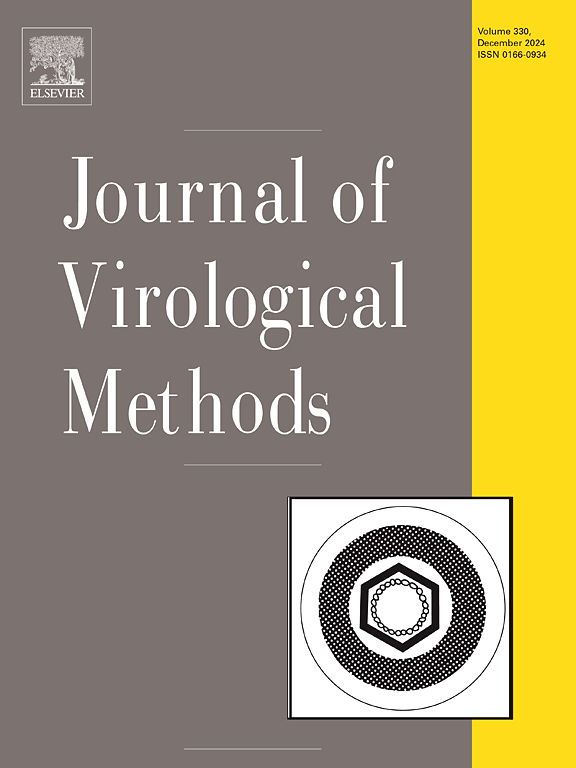Mapping and quantification of potato virus A RNA genomes within viral particles and polysomes in infected plant cells
IF 2.2
4区 医学
Q3 BIOCHEMICAL RESEARCH METHODS
引用次数: 0
Abstract
Potato virus A belongs to the genus Potyvirus, a group of single-stranded positive sense RNA viruses infecting crops worldwide. To initiate infection in a host, its genome takes part in different activities, viz., translation, replication, encapsidation during the infection cycle. Extensive research has been carried out to scrutinize the stages of potyviral infection cycle and decipher the strategies it employs to cause disease. Nonetheless, the amount of viral RNA taking part in translation and virion formation, at a given time point, is missing. In this study, we quantified the percentage of viral RNA that exists as virions and those that associates with host polysome, relative to total viral RNA in infected plant tissue. We employed a revised version of immuno-capture reverse transcription PCR and polysome profiling to address our queries. We tested three different coating antibody concentrations and further optimized the immuno-capture reverse transcription PCR protocol to address its limitation of binding and retaining viral particles. Our results indicate that most of the viral RNA (69 %) exists as encapsidated genomes, while 3 % of total viral RNA associates with host polysomes. These findings are crucial for correct interpretation of quantitative translational studies in which correlation must be made between the number of polysome-associated transcripts and the amount of protein synthesized.
绘制受感染植物细胞中病毒颗粒和多聚体内马铃薯病毒 A RNA 基因组的图谱并对其进行定量。
马铃薯病毒 A 属于马铃薯病毒属(Potyvirus),是一组感染全球农作物的单链正感 RNA 病毒。为了启动对宿主的感染,其基因组在感染周期中会参与不同的活动,即翻译、复制和封装。为了仔细研究壶状病毒感染周期的各个阶段并破译其致病策略,已经开展了广泛的研究。然而,在特定时间点参与翻译和病毒形成的病毒 RNA 数量却不详。在这项研究中,我们量化了感染植物组织中以病毒形式存在的病毒 RNA 和与宿主多聚体结合的病毒 RNA 占病毒 RNA 总量的百分比。我们采用免疫捕获反转录 PCR 和多聚体分析的修订版来解决我们的疑问。我们测试了三种不同的包被抗体浓度,并进一步优化了免疫捕获反转录 PCR 方案,以解决其在结合和保留病毒颗粒方面的局限性。我们的结果表明,大部分病毒 RNA(69%)以包被基因组的形式存在,而病毒 RNA 总量的 3% 与宿主多聚体结合。这些发现对于正确解释定量转化研究至关重要,因为在定量转化研究中,必须将多聚体相关转录本的数量与合成的蛋白质数量联系起来。
本文章由计算机程序翻译,如有差异,请以英文原文为准。
求助全文
约1分钟内获得全文
求助全文
来源期刊
CiteScore
5.80
自引率
0.00%
发文量
209
审稿时长
41 days
期刊介绍:
The Journal of Virological Methods focuses on original, high quality research papers that describe novel and comprehensively tested methods which enhance human, animal, plant, bacterial or environmental virology and prions research and discovery.
The methods may include, but not limited to, the study of:
Viral components and morphology-
Virus isolation, propagation and development of viral vectors-
Viral pathogenesis, oncogenesis, vaccines and antivirals-
Virus replication, host-pathogen interactions and responses-
Virus transmission, prevention, control and treatment-
Viral metagenomics and virome-
Virus ecology, adaption and evolution-
Applied virology such as nanotechnology-
Viral diagnosis with novelty and comprehensive evaluation.
We seek articles, systematic reviews, meta-analyses and laboratory protocols that include comprehensive technical details with statistical confirmations that provide validations against current best practice, international standards or quality assurance programs and which advance knowledge in virology leading to improved medical, veterinary or agricultural practices and management.

 求助内容:
求助内容: 应助结果提醒方式:
应助结果提醒方式:


